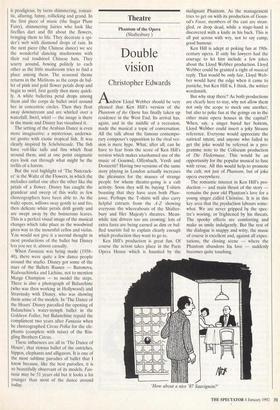Theatre
Phantom of the Opera (Shaftesbury )
Double vision
Christopher Edwards
Andrew Lloyd Webber should be very pleased that Ken Hill's version of the Phantom of the Opera has finally taken up residence in the West End. Its arrival has, again, and in the middle of a recession, made the musical a topic of conversation. All the talk about the famous contempo- rary composer's opposition to the rival ver- sion is mere hype. What, after all, can he have to fear from the score of Ken Hill's version which makes unashamed use of the music of Gounod, Offenbach, Verdi and Donizetti? Having two versions of the same story playing in London actually increases the pleasures for the masses of strange people for whom theatre-going is a cult activity. Soon they will be buying T-shirts boasting that they have seen both Phan- toms. Perhaps the T-shirts will also carry helpful extracts from the A-Z showing everyone the whereabouts of the Shaftes- bury and Her Majesty's theatres. Mean- while taxi drivers too are crowing: lots of extra fares are being earned as dim or baf- fled tourists fail to explain clearly enough which production they want to go to.
Ken Hill's production is great fun. Of course the action takes place in the Paris Opera House which is haunted by the
malignant Phantom. As the management tries to get on with its production of Goun- od's Faust, members of the cast are stran- gled, or drop dead, while a stage-hand is discovered with a knife in his back. This is all put across with wry, not to say camp, good humour.
Ken Hill is adept at poking fun at 19th- century opera. If only his lawyers had the courage to let him include a few jokes about the Lloyd Webber production. Lloyd Webber could be granted a right of musical reply. That would be only fair. Lloyd Web- ber would have the edge when it came to pastiche, but Ken Hill is, I think, the wittier wordsmith.
But why stop there? As both productions are clearly here to stay, why not allow them not only the scope to mock one another, but also to poke fun at the goings on in the other main opera houses in the capital? When, say, a singer bared her bottom, Lloyd Webber could insert a joky Strauss reference. Everyone would appreciate the satirical intent, and anyone who failed to get the joke would be referred in a pro- gramme note to the Coliseum production of Die Fledermaus. This would be an opportunity for the popular musical to fuse with revue. All this would help.to promote the cult, not just of Phantom, but of joke opera everywhere.
The romantic interest in Ken Hill's pro- duction — and main thrust of the story remains the poor old Phantom's love for a young singer called Christine. It is in this key area that the prpduction labours some- what. We are never gripped. by. the spec- tre's wooing, or frightened by his threats. The spooky effects are comforting and make us smile indulgently. But the rest of the dialogue is snappy and witty, the music of course is excellent and, against all expec- tations, the closing scene — where the Phantom abandons his love — suddenly becomes quite touching.
'How about a n'ce '87 Sauvignon?'










































 Previous page
Previous page